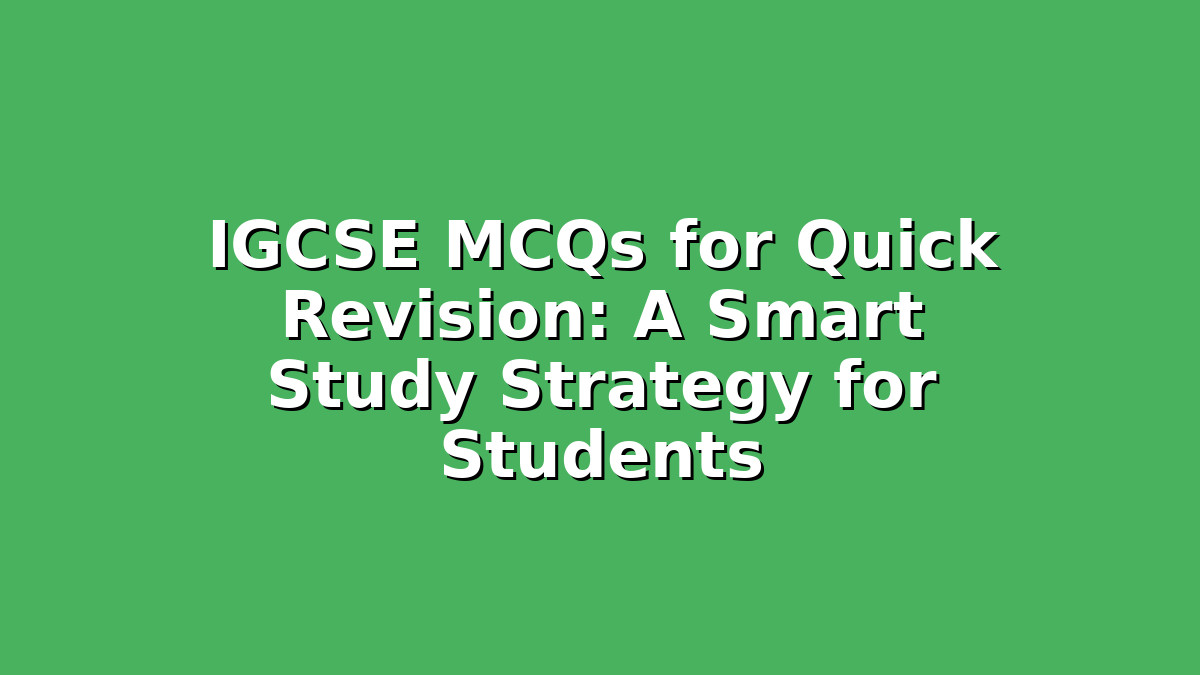Preparing for IGCSE exams can feel overwhelming, especially with the vast amount of content you need to cover across multiple subjects. Whether you’re aiming for top grades or simply want to feel confident on exam day, effective revision techniques are key. One powerful method to boost your understanding and retention is practicing Multiple Choice Questions (MCQs). This blog post will explore how IGCSE MCQs can be a fantastic tool for quick revision, offer practical tips on using them effectively, and guide you on integrating them into your study routine.
Why Use IGCSE MCQs for Quick Revision?
MCQs are a popular exam format in IGCSE assessments because they test a wide range of topics quickly and efficiently. For students, this format offers several distinct advantages:
– Broad Topic Coverage: MCQs allow exposure to many different concepts in a short time.
– Instant Feedback: Many online platforms provide immediate results, helping you identify areas that need improvement.
– Active Recall Practice: Answering questions forces you to retrieve information, strengthening memory.
– Time Management: Practicing MCQs improves your ability to answer questions under time constraints.
By incorporating IGCSE MCQs into your study plan, you can make your revision sessions more dynamic and focused.
1. Use MCQs to Identify Knowledge Gaps
One of the biggest challenges while preparing for IGCSE exams is knowing what you don’t know. MCQs help you discover these gaps quickly.
– Target Weak Areas: When you practice a set of MCQs, pay attention to the questions you get wrong or find difficult. This highlights topics where your understanding is shaky.
– Avoid Passive Reading: Simply reading textbooks or notes can give a false sense of security. MCQs require active engagement, revealing the limits of your knowledge.
– Create a Revision List: Based on your performance, list the topics needing further review. This focused approach saves time and boosts efficiency.
For example, if you find multiple questions on biology cell structure challenging, spend extra time revising that chapter. This targeted revision ensures you build a solid foundation before moving on.
2. Simulate Exam Conditions to Build Confidence
Exam nerves can negatively affect your performance. Practicing MCQs under exam-like conditions can help you stay calm and confident on test day.
– Set a Timer: Allocate a specific time to complete a set of MCQs. This trains you to pace yourself and reduces anxiety about running out of time.
– Avoid Distractions: Replicate the exam environment by turning off your phone and studying in a quiet space.
– Review Mistakes: After completing a timed quiz, carefully check your answers. Understand why you made mistakes and revisit those topics.
By regularly simulating exams with MCQs, you’ll improve your speed, accuracy, and resilience. Over time, this practice turns exam day into just another revision session rather than a high-pressure event.
3. Combine MCQs with Other Revision Techniques
While MCQs are powerful, combining them with other study methods can maximize your results.
– Use Flashcards: Create flashcards for MCQ questions you frequently get wrong. Flashcards help reinforce concepts through spaced repetition.
– Form Study Groups: Discuss MCQ questions with classmates. Explaining answers to others deepens your understanding.
– Write Summaries: After practicing MCQs on a topic, write a brief summary in your own words. This consolidates your learning.
– Watch Video Tutorials: If certain MCQ topics are unclear, look for online videos that explain the concepts visually.
Mixing these methods keeps studying interesting and addresses different learning styles. MCQs act as an excellent checkpoint within a varied, balanced study plan.
Conclusion
IGCSE MCQs are an invaluable resource for quick and effective revision. They help you identify weak areas, build exam confidence, and actively engage with the material. By using MCQs to target your revision, simulate exam conditions, and combine them with complementary techniques, you set yourself up for success. Remember, consistent practice is key—integrate MCQs into your daily study routine to gradually boost your knowledge and exam skills. Stay focused, keep a positive mindset, and trust your preparation. You’re capable of achieving great results!
Good luck with your IGCSE exams!

Responses